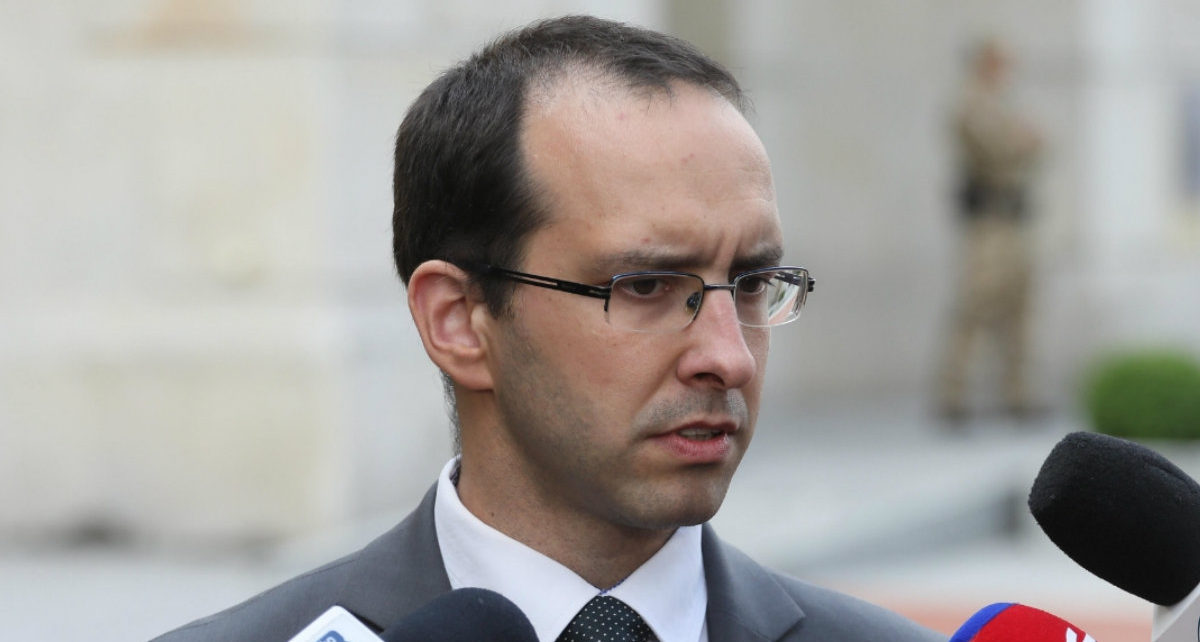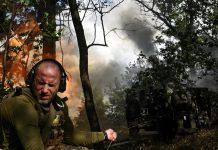By Stanisław Żaryn, for StopFake
They operate unofficially, without a flag, covered with a veil of silence and secret. Called a private army of Vladimir Putin, they appear in different parts of the world that are marked with conflicts, to pursue the Kremlin’s aims, even though Moscow officially denies any links with them. From Syria, through Sudan, The Central African Republic, Mali, Mozambique, to Ukraine – there, where Russian strategic interests are at stake, The Wagner Group’s mercenaries are also present.
The GRU legacy and Nazi roots
The beginnings of the Wagner Group are linked to the Russian special services milieu. Dmitrij Utkin, a former spetsnaz lieutenant colonel, is believed to be a founder and a commander of this private mercenaries unit, which initially operated as the Slavonic Corps. Wagner is his war nickname, chosen in honour of Adolf Hitler’s favourite composer. Utkin is fascinated with the German III Reich and Nazi ideology – his body is allegedly tattooed with some Waffen SS attributes.
Today „the Wagner Group” refers to the whole network of cooperating business, consulting and mercenary entities, but the Group itself as one organisation is not registered anywhere. Former soldiers of regular forces and retired special services officers serve in it.
The Wagner Group in Africa
Today the Wagner Group expands its influences in Africa and the group’s activity is perceived as playing a key role in the Russian strategy in the region. Very often they help central authorities to remain in power and they train local armies. No doubt they constitute a tool of Russian expansion in Africa.
The presence of the Wagner Group is reported in numerous African countries, where they use their experience previously gained in Syria. In Libya they were dislocating anti-personnel mines and in return they gained control over the biggest oil field in the country. In the Central African Republic, where they exploit gold and diamonds in a predatory way, they have been accused of replacing state authority and gaining control over the local tax system. In Mozambique they have been present since 2019. They have supported fights with one of guerrillas of the Islamic State and they have carried out their mission in the region rich in rubies and natural gas. The activity of the Wagner Group in Sudan was of geostrategic importance. A Russian naval base was planned to be built at the city of Port Sudan. Although the project was stopped, a possible construction of a permanent Russian base in Africa would change the balance of power in the Red Sea region.
Conflict in Mali
Mali, located in the Sahel belt, is now a region where the interests of jihadists, the West and the Russian federation clash. The country is important for security reasons, as it encompasses routes of illegal traffic and migrations. It has been steeped in conflict since 2012 and Islamic forces gained control over a part of the Malian territory. A real threat of terrorist attacks that would englobe Africa and Europe occurred. At the request of the Malian authorities, France, together with western forces, gave its support in the framework of the antiterrorist operation Barkhane and international task force Takuba. At the beginning, the French intervention recaptured major cities, but the jihadists were not defeated completely. Some new radical groups begun to emerge and the conflict expanded.
Although in July 2021 President Macron declared a gradual withdrawal from Mali and in December 2021 the French troops symbolically left Timbuktu – the city where President Hollande announced the beginning of the Malian operation– jihadist guerrillas are still destabilizing the region. In 2020 Mali was hit by the coup d’état and the military junta took over power. Western countries urge Mali to organize democratic elections as soon as possible but the junta – despite declarations made – is not willing to do so as it wants to remain in power.
In this context of unstable political situation, inefficient actions of the West and still active Islamic forces, the Wagner mercenaries have appeared in Mali. The Russian presence in Mali has been discussed since the end of 2021 and in January it was confirmed by various sources. Initially, commentators focused on logistic preparations, but eventually sources from the French and American armies, as well as the UN Secretary General confirmed that some 400 mercenaries were deployed in Mali. Simultaneously, the UN and media informed about a bloody mass execution perpetrated by the Wagner Group in the Central African Republic. At the beginning, the Malian authorities were silent about their cooperation with the Group or pointed out to its training character. But the presence of the mercenaries was confirmed even by Sergey Lavrov who, obviously, at the same time denied that Russia was somehow involved.
One must underline that the Wagner Group was invited to Mali in a very sensitive moment, when Moscow uses energy blackmail targeted at the West, is threatening with military intervention in Ukraine and openly aims at intensifying the conflict with the West which escalates NATO-Russia tensions. Meanwhile, relations between the Malian authorities and their western partners are getting worse. The presence of mercenaries confirms that the junta is looking for new alliances. Mercenaries, apart from fighting against jihadists, will probably help the army to remain in power. Such an aid has its price, though. Some Russian geologists have been seen in Mali, so possibly also there, as in other African countries, they will exploit natural resources. In addition, mercenaries are said to receive from the junta over 10 million USD per month.
Ukraine and other African destinations
The worsening relations between Mali and France and other western partners, as well as the lack of prospects to defeat Islamic guerrillas, may speed up the final withdrawal of the French army from Mali. In such a case, Russia, through the Wagner Group, would broaden its sphere of influence and strengthen its presence in Africa. There is a risk that this presence will be further expanded. At the end of January, there was a coup d’état in neighbouring with Mali Burkina Faso and Yevgeny Prigozhin has already expressed his satisfaction. He called the coup a „new era in African decolonisation”. The coup in Ouagadougou was also praised by Alexander Ivanov – one of the „trainers” present in Africa. In his opinion France did not achieve any success in the region as far as the fight against terrorism is concerned. He also made a proposal to „train” Burkinabe army, which for sure would mean the appearance of the Wagner mercenaries in another territory.
The development of the situation is also important in the context of possible Russian invasion in Ukraine. Russia is said to withdraw some mercenaries from Africa and direct them to the Russian-Ukrainian border in order to strengthen its potential with additional, apart from regular forces, means. Taking into account a large number of troops and equipment prepared for a potential invasion, the presence of several dozens of mercenaries do not change a lot, but it may reflect the Kremlin’s objectives and methods. Russia may carry out destabilizing activities without an official invasion and mercenaries will be a useful tool to escalate a tense situation, to support separatists in Donbas or to give Russia pretext to invade Ukraine.
The Wagner Group taking part in a hybrid and information war
Mercenaries allow Russia to pursue its strategic, economic and geostrategic interests and to expand the Russian sphere of influence, while absolving Moscow of its official responsibility and limiting the costs of such interventions. Russia becomes a strategic player there, where it does not want to or may not engage in an official way. Private military companies are a convenient and efficient tool in conflicts where unconventional means are used, just below the threshold of war. At the international scene, Moscow may disclaim any connexions with such actions, especially if mercenaries use brutal or illegal methods such as mass executions, tortures, kidnapping or plunder.
Although the Kremlin denies its links with the Wagner Group, its objectives and way of operating reflect the war doctrine formulated by General Gerasimov and they are in line with a traditional Russian model of using proxies in conflicts. Also methods typical of information and propaganda operations are visible in the Wagner Group’s actions. They „share” their post-Soviet experience and advise on how to discredit political opponents. The Group also offers support in electoral campaigns. Thanks to the Wagner Group, Russia becomes an alternative for the aid offered by the western countries. In this way, the Kremlin achieves also its propaganda objectives and proves that Russian forces may be successful there, where the West appear to be inefficient.
We cannot forget though about crucial economic objectives – for carrying out military interventions, supporting local armies and trainings, the Wagner Group makes immense profits, coming mainly from natural resources. These profits – while taking into account the network of connexions of the Wagner Group – are transferred to Russian oligarchs and also directly to the Kremlin.
But the fact that the Kremlin so willingly uses private troops in unofficial or “dirty” operations constitutes above all a strong signal showing how Putin wants today to wage a war. The Wagner Group is another proof that activities that are hidden in a “grey zone” and carried out there, where Russia is not present, using unconventional and hybrid methods, entered to the Kremlin’s military arsenal for good.
Stanisław Żaryn is Spokesperson of the Minister-Special Services Coordinator, Poland





